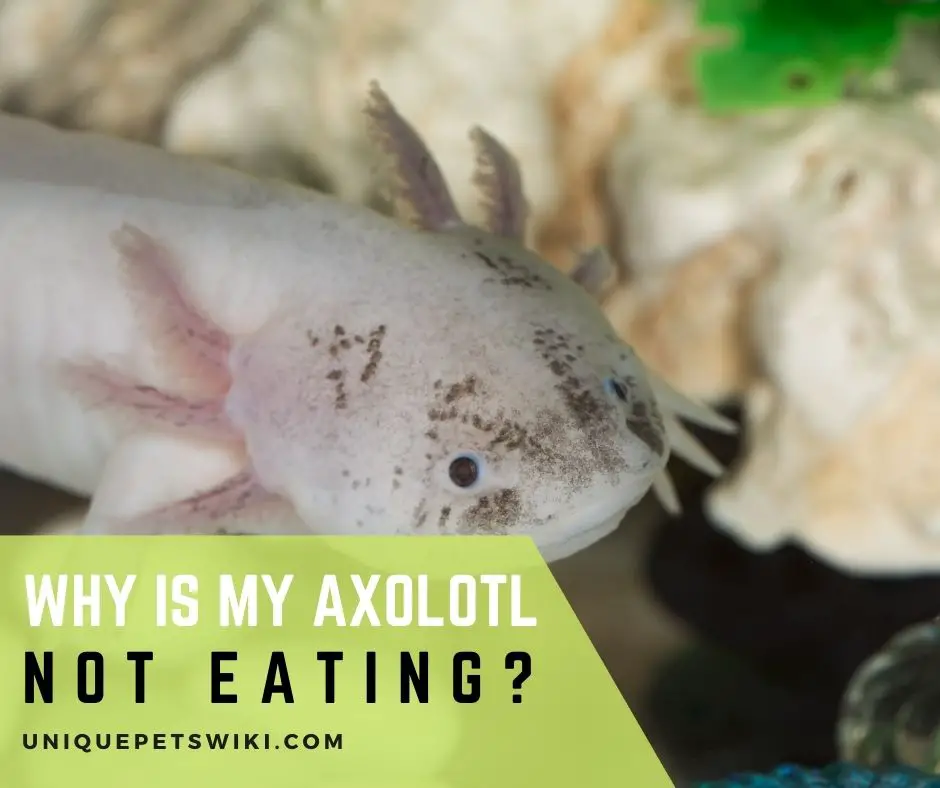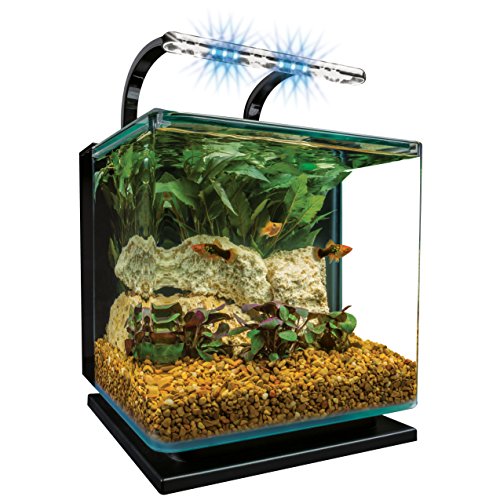Axolotls are quite durable and hardy creatures that you can keep as pets. They can adapt to colder conditions and go days without food. However, as a responsible axolotl owner, you may be wondering why is your axolotl not eating.
Just like other pets, axolotls need to eat to stay alive. However, they can stop eating for a wide range of things like a change of tank, feeding them with inadequate food, hot or polluted water, stress due to aggressive tank mates, and so on.
In this article, we will help elaborate on why your axolotl is not eating, from how long can axolotl go without eating to when you will need to force-feed your axolotl.
Contents
11 Causes Explain Why Is Your Axolotl Not Eating
Your axolotl can stop eating due to several reasons, and it can range from a simple cause to a more complex cause. For instance, a baby axolotl may stop eating because you are feeding it with food not suitable for it.
On the other hand, your axolotl may stop eating because it is impacted or constipated, which can be quite fatal if not detected early.
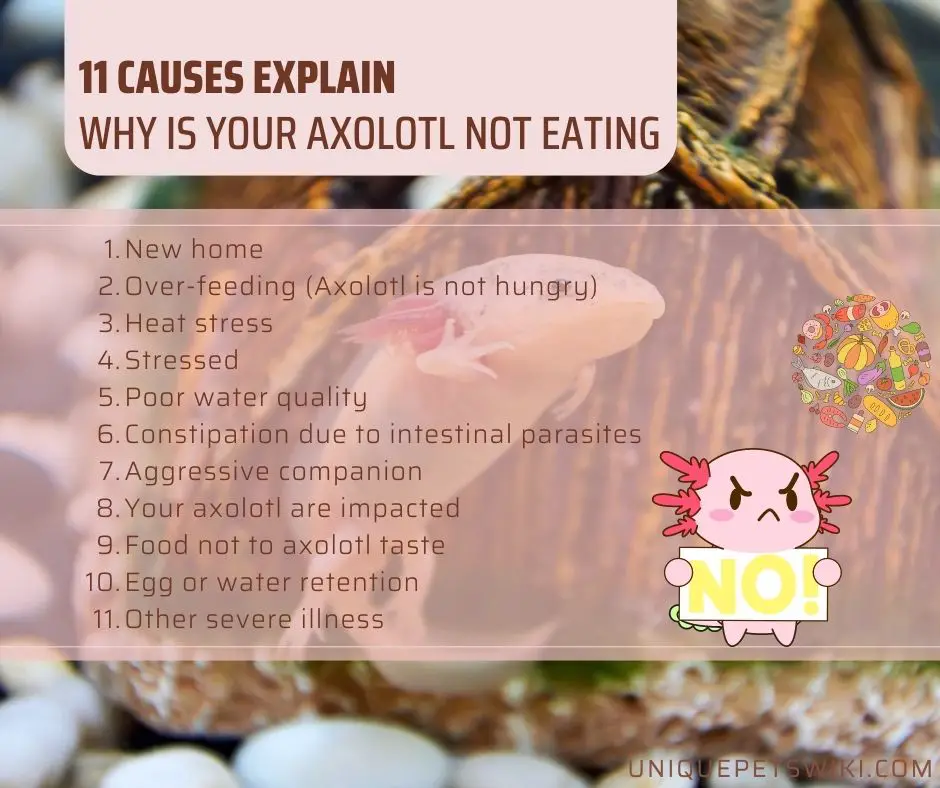
New Home
It is common for the axolotl not to eat when they are in a new environment. This is because they need time to adjust to a new environment and also because you may be feeding them with different food or using other feeding methods.
You don’t have to worry when this happens as your axolotl will start eating in 2 days to a week. If this continues after a week, you can ask the breeder whether the axolotl has stopped eating before you even buy it.
If this is the case, you may need to consult with the vet to help determine whether it is sick.
Over-feeding (Axolotl is not Hungry)
Your axolotl may stop eating if you overfeed them with food. Axolotls love meaty foods like earthworms or bloodworms.
As an axolotl owner, you need to be mindful of their feeding patterns because they don’t need many foods to survive.
That is, feeding them with 1 or 2 earthworms daily is enough to keep them healthy. However, overfeeding them with food can cause loss of appetite.
This is why you can first try to reduce the food you give your axolotls to help determine if their appetite will come back.
Heat Stress
A common and biggest reason your axolotl may stop eating is heat stress. The best thing is that you can easily solve this issue, but most axolotl owners don’t usually think of it at first.
The ideal tank temperature of the axolotl is between 60-65oF (16-18oC) and can even adapt to temperatures as low as 50oF (10oC).
Your axolotl is likely to stop eating if the temperature dips or rises too much. You can simply solve this issue by measuring the tank temperature to determine if their tank is at optimal range.
If the water is too cold, you can then opt for a heater or a way to heat the water to the appropriate levels.
However, if the water is too hot, you will need a chiller or a way to cool the water to the appropriate level.
Fluval 2-in-1 Digital Aquarium Thermometer
- 2-in-1: Measures water & room temperature accurately within 10C/20 F
- No probes or messy wires
- Large LCD display simultaneously shows aquarium and ambient room temperatures
- Thermometer for use in fresh and saltwater aquariums
Last update on 2022-12-29 / Affiliate links / Images from Amazon Product Advertising API
Stressed
Stress is one of the common reasons why an axolotl may stop eating. Some of the symptoms that an axolotl is stressed apart from refusing to eat are:
- Your axolotl eats but quickly vomits and regurgitate the food
- Your axolotl spends time hiding
- The axolotl swims wildly around the tank in a random way.
Stress in axolotl can be caused by a wide range of things such as moving them to a new tank, and the water quality is not good, they have an aggressive tank mate, too much heat or cold, etc.
The best way to treat this is to determine the cause of the stress before knowing how you can deal with it.
Poor Water Quality
A possible reason why your axolotl may stop eating is the poor water quality of their tank. Their stress level usually increases if the water quality in their tank is bad, and this can then cause health problems.
It is common for the axolotl to stop eating and even throw up if the ammonia level in their water is too much.
Apart from ammonia, axolotls may stop eating if their water is too turbulent, the cycle of nitrogen in their tank is not complete, or the water temperature is not ideal.
The best way to deal with bad water quality is to set up a good filtration system and also do regular maintenance.
You can regularly determine the water quality in their tank by checking the water, temperature, pH, and other tests. You will also need to change their water regularly to help keep the water quality in their tank in check.
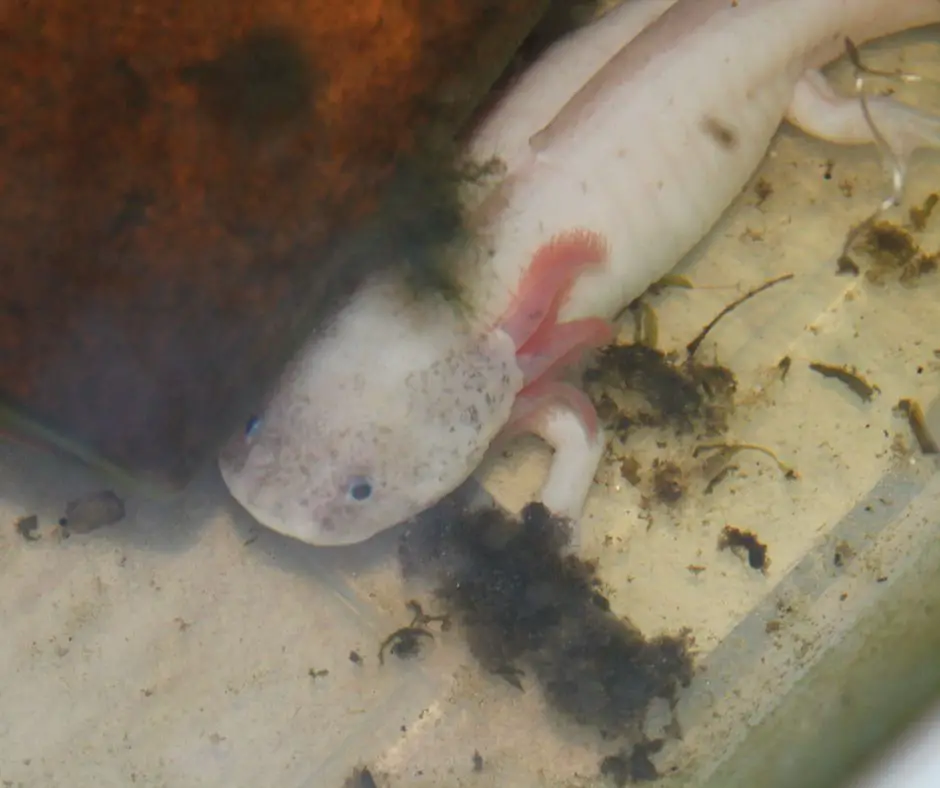
Constipation Due to Intestinal Parasites
There is a possibility that axolotls can get infested by internal parasites if you feed them with live food or unsterilized plants. Axolotls suffering from internal parasites like septicemia, Camallanus worms, Opalina, etc., usually lose their appetite.
Some of the signs that your axolotl is suffering from internal parasites are if it has a hard time keeping a balanced weight, it becomes skinny, refuses food, or throws up.
The best way to determine that your axolotl is suffering from internal parasites is to consult with a vet.
You will need a sample of your axolotl’s poop to the vet to diagnose and identify the parasite. Once the parasite is identified, your vet will then determine the best way to treat it.
Aggressive Companion
Generally, axolotls usually get stressed very easily if housed with a more aggressive axolotl. This can cause the less aggressive axolotls to lose appetite and may even try to hide while the dominant axolotls eat all the food.
You can also determine that an axolotl is being bullied if it is injured, as this shows that its tank mate has attacked it. A great way to deal with an aggressive companion is to ensure you house axolotls and other animals of the same size together.
You should also try to feed aggressive animals in a separate container to help ensure everybody gets to eat their own food.
Your Axolotl Are Impacted (Your Axolotl Ingested Something)
Impaction is one of the serious issues that can cause loss of appetite in axolotl. Axolotls love eating and eat without care at times. They can then become impacted if they ingest gravel or sand substrate in their cage.
The ingested sand or gravel can then compact together with the food to clog up their digestive tract, making them lose their appetite. Impaction is a fatal condition and can lead to death if you don’t resolve it quickly.
The best way to treat impaction in axolotls is to consult your vet for treatment.
MarineLand Contour Glass Aquarium Kit with Rail Light
- SLEEK DESIGN: Rounded corners and clear glass canopy allow viewing from multiple angles.
- DAYLIGHT/MOONLIGHT SETTINGS: Bright white LEDs create a shimmering sunlight effect; blue LEDs produce a moonlit glow.
- HIDDEN FILTRATION: Advanced, three-stage filtration is out of sight to enhance aquarium viewing.
- EASY ACCESS: Hinged LED rail light and sliding glass canopy.
- DIMENSIONS: The Marineland Contour 3 Aquarium measures 9.5" x 10" x 10".
Last update on 2022-12-29 / Affiliate links / Images from Amazon Product Advertising API
Food Not To Axolotl Taste
Axolotls prefer a carnivorous diet as they love eating live foods but can also eat pellets and frozen foods. Although axolotls like to eat a lot, feeding them with the wrong types of food can make your axolotl stop eating.
Axolotls can spit food or stop eating if their food is too big, hard, or has a nasty taste. The best way to go about this is to feed your axolotls with different foods to determine what it likes. You can also cut large food in half before feeding your axolotls.
Another thing is to avoid using worms that taste bitter like red wigglers to feed your axolotls. You should try to feed your axolotls with a pellet that will soften rapidly in water.
However, if you are not sure what to feed your axolotl, you can consult with your vet to help determine a suitable food for your axolotls.
Egg or Water Retention
Egg or water retention is a rare health condition that can happen to your axolotl. Egg retention usually occurs to the female axolotl, and it occurs when the eggs are not looking viable, or it has difficulty laying eggs.
Egg or water retention usually causes discomfort and severe bloating that can block axolotl’s digestive tract, making them lose appetite. You can treat axolotl that looks bloated by housing it in a 40% concentration of John’s or Holtfreter’s solution.
You can also try to pair a female axolotl with a male to help trigger egg-laying and put plants or décor to deposit the eggs. However, if there is no improvement after 48 hours, you can contact a vet as fast as possible for diagnosis and the best treatment.
Other Severe Illness
One of the common signs that an axolotl is suffering from a severe illness is losing its appetite. However, there is not much you can do if your axolotl suffers from a severe health issue.
The best thing you can do is visit a vet for diagnosis and the best way to treat the disease.
Some of the common axolotl diseases that can affect your axolotl are:
- Tumors that develop at old age or after a traumatic injury
- Internal bacteria or parasites infection.
What Do I Do If My Axolotl Won’t Eat?
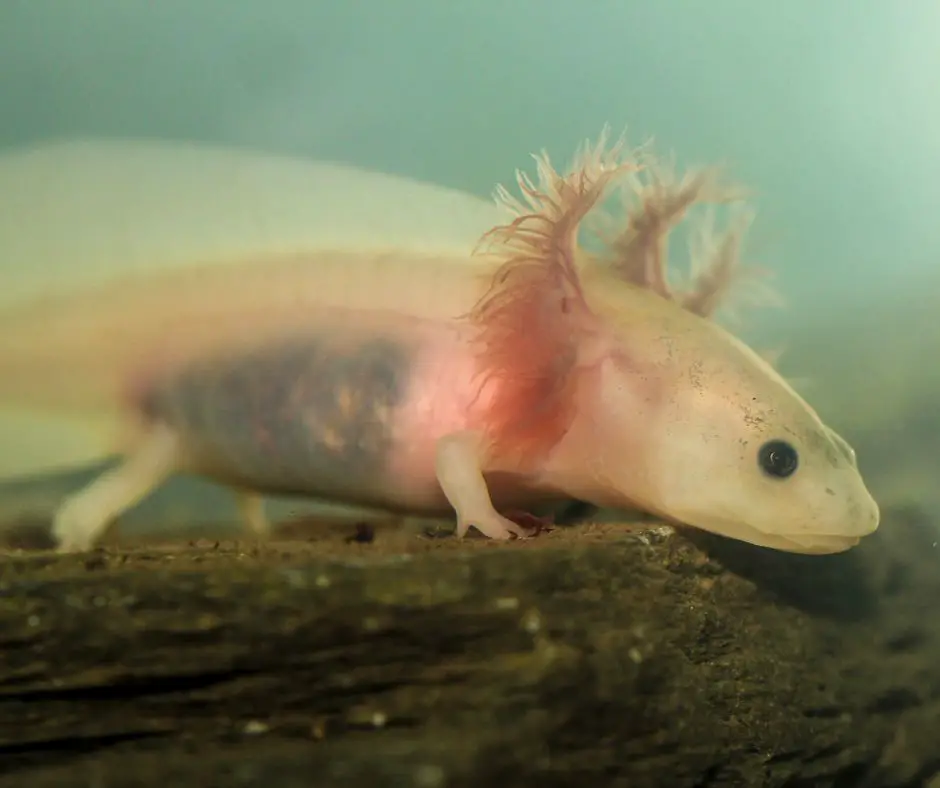
There are a lot of things that you can do if your axolotl stops eating. Some of the things that you can do are listed below:
- Give your axolotl time to acclimatize to a new environment
- Try to feed your axolotl with smaller size food to help them swallow it faster.
- Feed your axolotl with pellets with sizes suitable for their size and age.
- Feed your axolotl with its favorite food and include live foods like worms.
- Always check the water conditions of your axolotl’s tank
- Keep an eye on your axolotl’s tank mates
- Consult with your vet for assistance.
When Do You Need to Force Feed An Axolotl?
Generally, it is not a good idea to force-feed your axolotl. However, you can force-feed your axolotls if they do not eat and are at risk of dying due to starvation.
This means force-feeding should be only a last resort after exploring other options, and it does not work.
Note: it is not recommended that you force feed young axolotl as they are usually very soft, and this means you can easily hurt them by force-feeding them.
How Long Can Axolotls Go Without Food
Generally, it usually takes some time for axolotls to digest their food and can go for around 2-3 days without eating.
A well-fed axolotl can easily survive without food for about three weeks if the water temperature in their enclosure is at an ideal level (below 59oF or 15oC).
However, an axolotl that is still adapting to a new environment can go for over three days without eating.
Conclusion
Axolotls usually take some time to digest their food and can easily go for about 2-3 days without eating. This means you don’t need to be concerned or panic immediately that you notice they are not eating.
There are several reasons why axolotls may stop eating, and it is best to investigate why your axolotl stops eating to help determine how to treat it.
